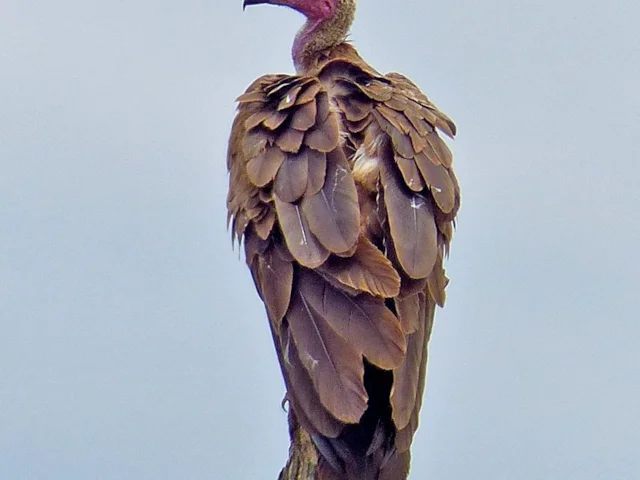African vultures plummeting towards extinction
5d573a75-83c4-48cf-877e-841b61f55c80

The first estimates of the decline of African vulture species over the last 30 years indicate that they have lost 62 per cent of their populations on average.
A new study of all eight African vulture species shows that on top of this massive decline, seven of them had decreased by 80 per cent in just three generations, while six qualify for up-listing to Critically Endangered on the IUCN's Red List. The species concerned are Lammergeier, as well as Egyptian, White-backed, Rüppell's, Cape, Hooded, Lappet-faced and White-headed. Griffon Vulture, itself known to be suffering a decline, was not included in the figures.
Worryingly, African vultures appear to be following those of Asia, which declined by around 99 per cent owing to the use of diclofenac, a veterinary medicine which poisoned birds at the top of the food chain by accumulation. The populations have only barely just started to recover in the last few years.
The causes for these declines appear to be mostly poisoning and use in traditional medicines, which combined account for 90 per cent of vulture deaths. A substantial part of the poisoning is illegal and derives from rhino and elephant poachers intentionally leaving poisoned carcasses to kill vultures, thus avoiding the detection of the victims of their own activities. Other poisoned carcasses left out to kill livestock predators such as feral dogs, jackals, Lions and hyenas, also contributed to the death toll.
In traditional medicine, vulture body parts are believed to cure both mental and physical illnesses, as well as improving luck in gambling and love, and increasing intelligence in children, much as in Chinese medicine. Vulture meat is also sold and trafficked as 'bushmeat', in smoked form. Disturbance and habitat loss, as well as food scarcity may also contribute to the losses of vultures.
Substantial declines were found all over the continent, though they were more significant in East Africa than West, and steeper within protected areas, partly as earlier declines had already affected those vulture populations outside reserves and parks.
The authors of the paper conclude that African governments thoroughly enforce the law regarding the usage of pesticides and poisons, stop the trade in vulture body parts for medicine and food, and try to minimise the deadly effects of power lines and wind turbines.
Reference
Ogada, D, Shaw, P, Beyers, R L, Buij, R, Murn, C, Thiollay, J M, Beale, C M, Holdo, R M, Pomeroy, D, Baker, N, Kruger, S C, Botha, A, Virani, M Z, Monadjem, A, and Sinclair, A R E. 2015. Another Continental Vulture Crisis: Africa's Vultures Collapsing toward Extinction. Conservation Letters 0: 1-9 doi: 10.1111/conl.12182.
A new study of all eight African vulture species shows that on top of this massive decline, seven of them had decreased by 80 per cent in just three generations, while six qualify for up-listing to Critically Endangered on the IUCN's Red List. The species concerned are Lammergeier, as well as Egyptian, White-backed, Rüppell's, Cape, Hooded, Lappet-faced and White-headed. Griffon Vulture, itself known to be suffering a decline, was not included in the figures.
Worryingly, African vultures appear to be following those of Asia, which declined by around 99 per cent owing to the use of diclofenac, a veterinary medicine which poisoned birds at the top of the food chain by accumulation. The populations have only barely just started to recover in the last few years.
The causes for these declines appear to be mostly poisoning and use in traditional medicines, which combined account for 90 per cent of vulture deaths. A substantial part of the poisoning is illegal and derives from rhino and elephant poachers intentionally leaving poisoned carcasses to kill vultures, thus avoiding the detection of the victims of their own activities. Other poisoned carcasses left out to kill livestock predators such as feral dogs, jackals, Lions and hyenas, also contributed to the death toll.
In traditional medicine, vulture body parts are believed to cure both mental and physical illnesses, as well as improving luck in gambling and love, and increasing intelligence in children, much as in Chinese medicine. Vulture meat is also sold and trafficked as 'bushmeat', in smoked form. Disturbance and habitat loss, as well as food scarcity may also contribute to the losses of vultures.
Substantial declines were found all over the continent, though they were more significant in East Africa than West, and steeper within protected areas, partly as earlier declines had already affected those vulture populations outside reserves and parks.
The authors of the paper conclude that African governments thoroughly enforce the law regarding the usage of pesticides and poisons, stop the trade in vulture body parts for medicine and food, and try to minimise the deadly effects of power lines and wind turbines.
Reference
Ogada, D, Shaw, P, Beyers, R L, Buij, R, Murn, C, Thiollay, J M, Beale, C M, Holdo, R M, Pomeroy, D, Baker, N, Kruger, S C, Botha, A, Virani, M Z, Monadjem, A, and Sinclair, A R E. 2015. Another Continental Vulture Crisis: Africa's Vultures Collapsing toward Extinction. Conservation Letters 0: 1-9 doi: 10.1111/conl.12182.

